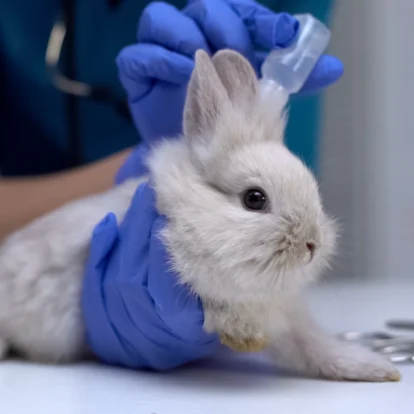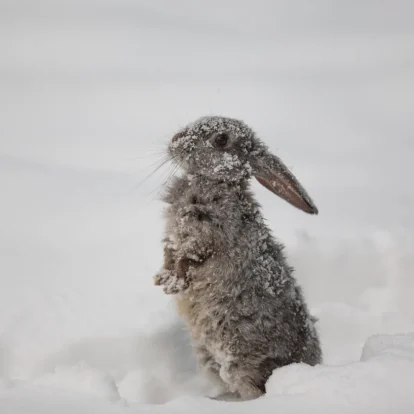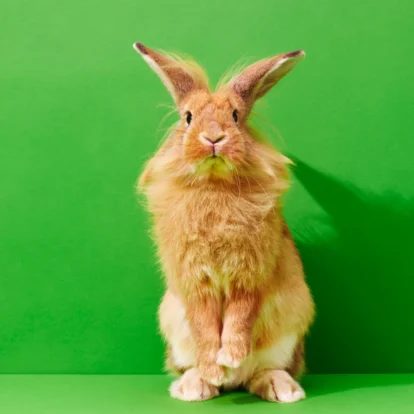Table of Contents
Introduction
Hello bunny lovers! 🐇 Today, we’ll dive nose-first into a topic that’s as fluffy as important – how long are rabbits pregnant?
As a long-time rabbit breeder, I’ve seen my fair share of baby bunnies and am ready to share all the knowledge I’ve gathered over the years. From understanding the telltale signs of a pregnant pet rabbit to learning the ins and outs of their nesting behavior, this post is your one-stop-shop for all things related to rabbit pregnancy.
Now, you might wonder, “Why the sudden interest in bunny bellies?” Well, as any rabbit owner knows, our female rabbits are pretty prolific breeders. One day, it’s just your adorable pet rabbit hopping around, and the next, you’re playing nurse to a litter of baby rabbits. Trust me, knowing when to expect those cute bundles of joy is essential – and that’s where I come in.
Stick with me; you’ll be a bunny pregnancy pro in no time. 🐇👍 From how many weeks it takes to how to feed and care for your pregnant furball, we’ve got a lot to cover, so let’s hop to it!
When Can a Rabbit Get Pregnant?
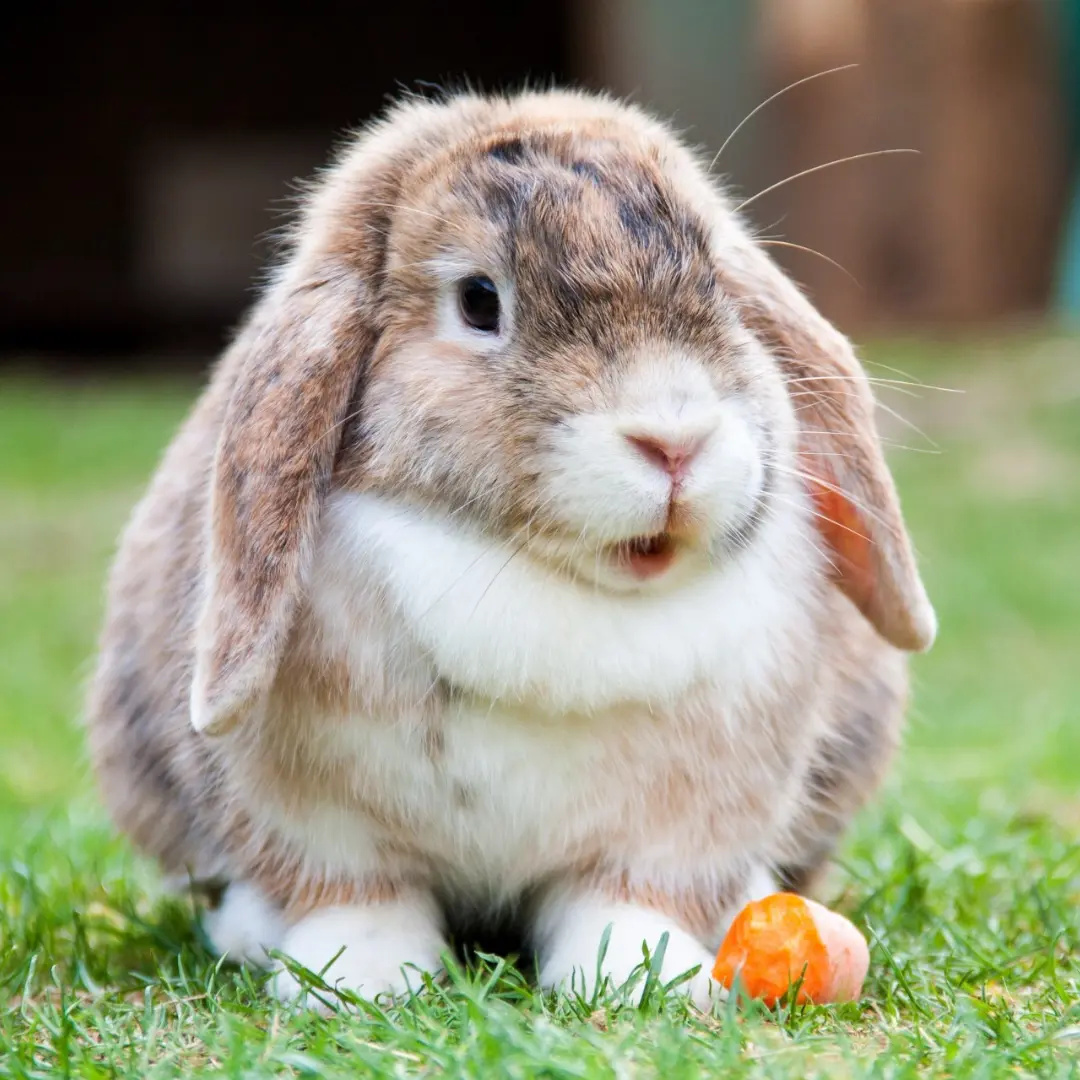
So, when can a rabbit get pregnant? 🐇 It’s a question I often get asked, and the answer is pretty straightforward. Female rabbits, also known as does, can start getting pregnant as young as 4 to 6 months old, which is their age of sexual maturity. ⏳ Yes, that’s quite an early age compared to many animals, such as cats! I always advise pet rabbit owners to be mindful of this when their little furballs grow fur and reach their young age of sexual maturity.
It’s also important to note that male rabbits, or bucks as we call them, become sexually mature even sooner, sometimes as young as 3 months! 😲 Talk about being eager! So, if you’ve got both male and female pet rabbits hopping around, you might find yourself surprised with a bunch of baby bunnies sooner than you’d think!
Now, just because a female rabbit can get pregnant at such a young age doesn’t mean it’s the best time for them. From my rabbits’ experience, I’ve found that it’s often better to wait until the doe is a bit older before she becomes a mother. This can help prevent any unwanted pregnancy complications that can sometimes occur in younger rabbits. 🐾
The whole process of how long are rabbits pregnant is typically around 28 to 31 days. So, once your female rabbit is pregnant, you won’t have to wait too long to meet those adorable little bundles of joy! 🐇🐇🐇 But make sure you’re prepared for the pitter-patter of tiny paws because caring for pregnant rabbits and their kits is a whole new adventure!
But don’t worry; we’ll cover all of that in the upcoming sections! 😊
Pregnancy Signs: How to Tell If a Rabbit Is Pregnant
Recognizing the signs of pregnancy in rabbits can be a tricky business. From my experience, there are some telltale signs that a female rabbit might be expecting. 🐇
Young rabbits, particularly those bred for the first time, might change their appetite or behavior. Typically, they might start to eat a bit more than usual, but it can also swing the other way, with some female rabbits eating less.
Another common sign of pregnancy is nest building. You might notice your doe start to gather hay or other materials she finds in her enclosure, dragging them over to a preferred corner. This nest-boxing behavior is typically accompanied by your doe pulling out her own fur to line the nest. It can be quite a spectacle if you’ve never seen it before!
In my opinion, one of the most magical experiences happens around days 10 to 12 of the pregnancy. 🗓️ You are in for a sweet surprise! 🎁 This is typically when you can feel the baby bunnies jumping around in your rabbit’s belly for the first time. 🐇🐇🐇 Yes, you read it right!
Ok, so gently place your hand on her belly and feel those tiny flutters. These little kicks and punches can be subtle, so you must be patient and sensitive. It may take a few tries before you can actually feel anything. But once you do, it’s such an incredible and heartwarming sensation. Don’t forget to always handle your pregnant rabbit gently and with care, as they can be susceptible during this time.
Speaking of nests, let’s talk about nest boxes. Around the 27th day, putting a nest box in the doe‘s enclosure is a good idea. You might notice your doe moving the hay around and preparing the nest box for the arrival of her kits. But remember, not all nest building is a guaranteed sign of pregnancy. Some female rabbits can experience a false pregnancy. 😯
False Pregnancies in Rabbits
False pregnancies can occur in rabbits, most commonly in an unneutered female. They can be quite a shock if you’re not expecting it! False pregnancy is a phenomenon where a doe exhibits all the signs of pregnancy, right from nest building to even her temperament changing, but she is not actually pregnant. 🤔
She might become aggressive or start digging obsessively. Even though she hasn’t been around neutered or unneutered male rabbits, she might make a nest, pulling her own fur out.
False pregnancies usually last about 17 to 18 days and can happen every few months. This is why getting rabbits neutered is so important if you’re not planning to breed them. It can be quite an emotional rollercoaster for both the rabbit and the owner to go through a phantom pregnancy. So, it’s always good to be prepared and have all the necessary information at your fingertips.
And, just like with real pregnancies, it’s always a good idea to keep an eye on your doe during this time. If she’s acting overly aggressive or isn’t eating or drinking, it could be a sign of a health issue and a good time to call the vet. 👨⚕️
How Long Are Rabbits Pregnant?
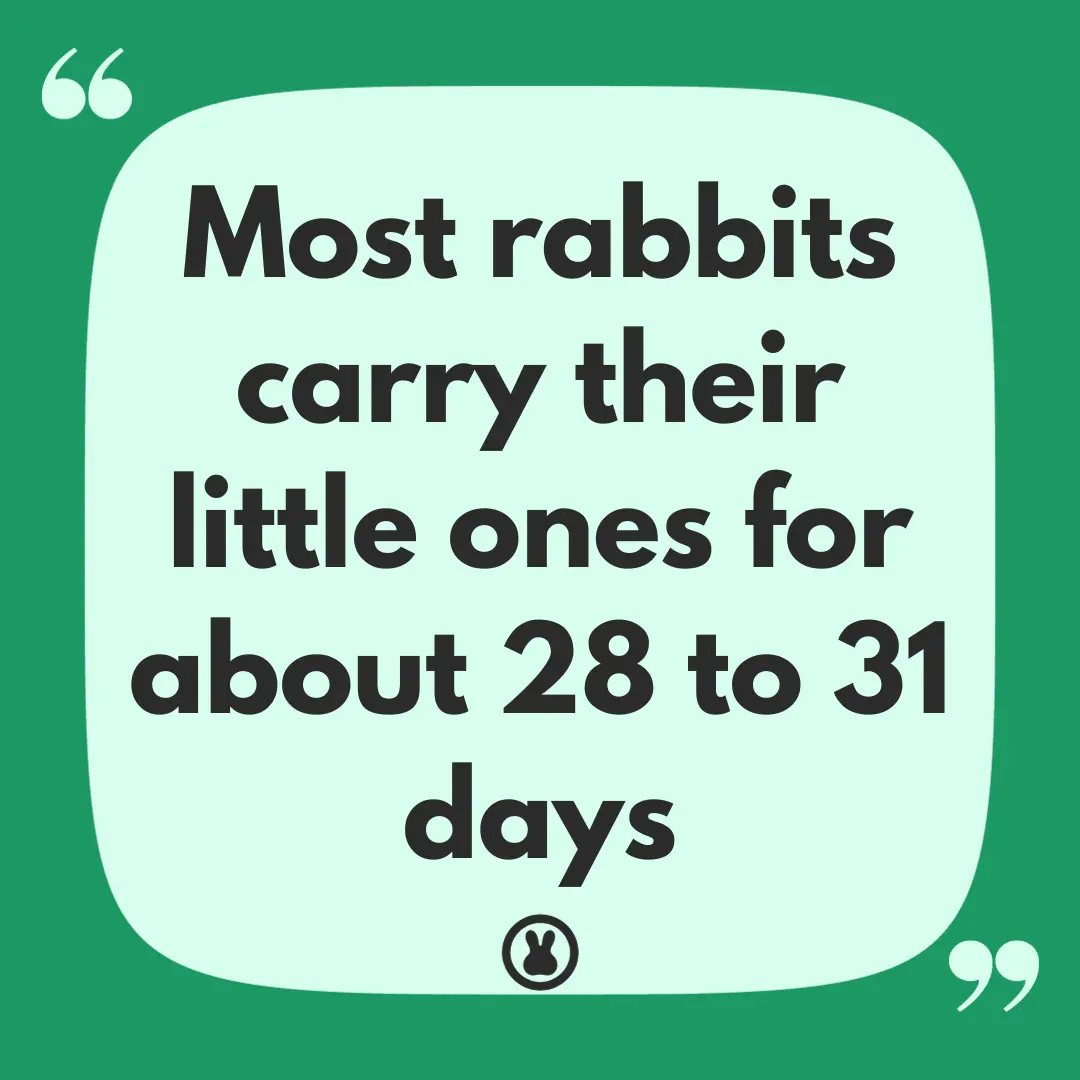
Well, let’s dive into the heart of the matter: how long is a rabbit pregnant? Most rabbits carry their little ones for about 28 to 31 days. Yep, that’s right. It’s only a month – blink, and it’s already time for the babies! 🐰🐇
In my experience with rabbit breeding, I’ve found that the females are amazingly efficient at being mothers. The rabbit gestation period may be short, but a lot happens in those few weeks. From conception, it’s a race against time as the mother rabbit prepares herself and her nest for the arrival of her kits.
There’s no time for dilly-dallying when rabbits live life in the fast lane! 🏎️💨 . It’s been amazing and humbling to witness this process unfold; the mother rabbit nesting away in the early hours, her every movement a testament to the instinctual drive of nature.
Remember how I mentioned earlier that rabbit pregnancies are short? That’s not even the half of it! After giving birth, most females can mate and become pregnant again almost immediately. Yeah, you read that right – mere hours after giving birth, mother rabbits are ready to start the process all over again. How’s that for efficiency? 🐇💪👏 So monitoring and separating male and female rabbits after birth is essential to prevent overbreeding.
What’s clear from my experience is that rabbit breeding is a magnificent, whirlwind journey. From day one of pregnancy to the early hours of giving birth, each moment is filled with anticipation, wonder, and a dash of nervous excitement! 🎈🎉 It’s a true testament to how incredible nature can be.
Taking Care of a Pregnant Rabbit
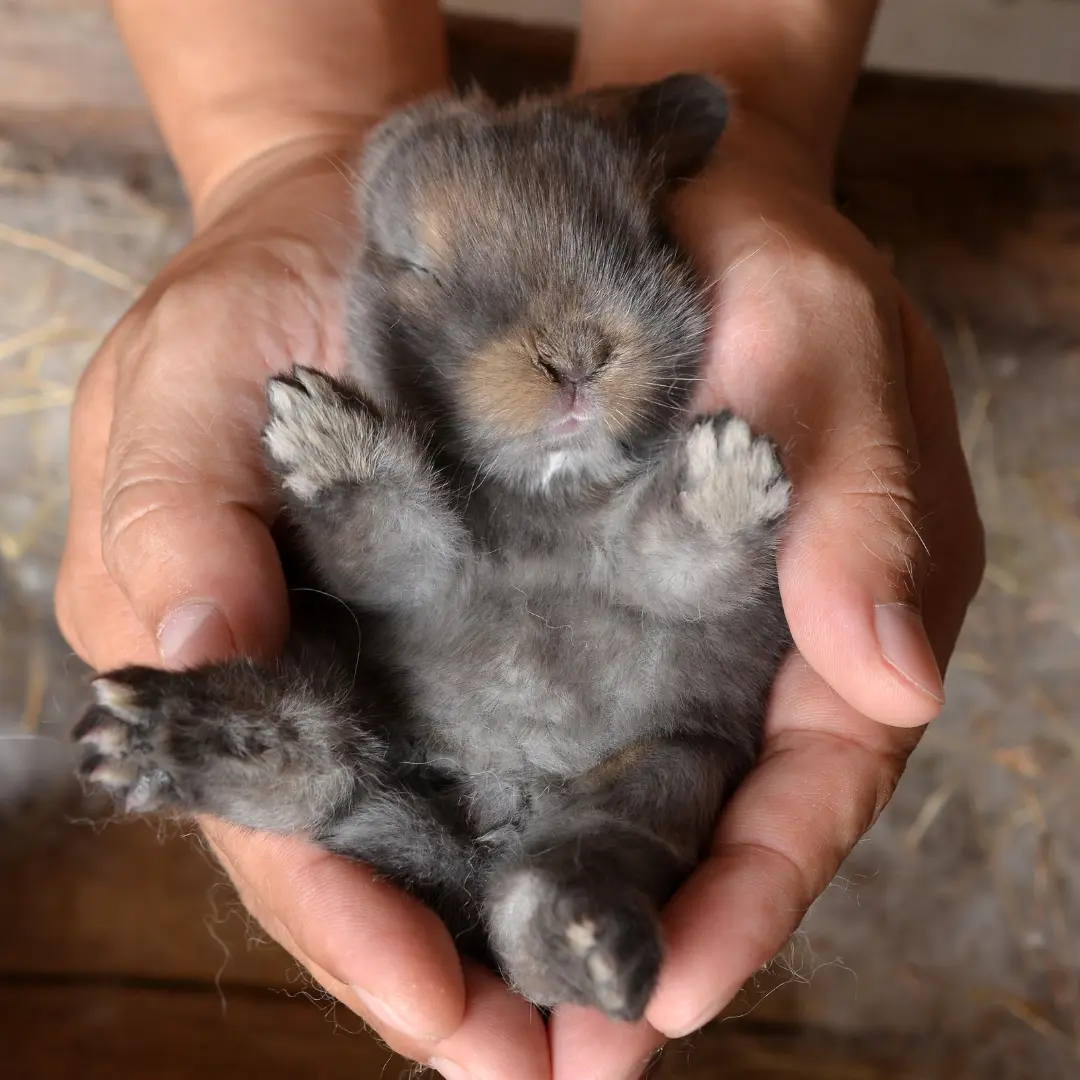
Taking care of a pregnant rabbit is both a joy and a responsibility. It’s important to remember that both the doe and the male rabbit will need their own space. So, you’re not caring for one rabbit here—you’re looking after two rabbits, each with their own set of needs. 🐇🐇
First things first, let’s talk basics. A pregnant doe will need a nesting box. You can’t just use any box. It needs to be safe, secure, and filled with extra hay for comfort. I always use alfalfa hay. It’s not only soft and comfy for the female rabbit but also rich in calcium, which is great for her and her future kits. And speaking of kits, be prepared for a large litter! Rabbits are known for their ability to populate, after all! 📦🌾
Now, onto the male rabbit. While the doe is busy with her pregnancy, the buck needs extra attention. Keep in mind that rabbits are social animals, and they thrive on interaction. So, don’t forget to shower him with love and affection! 💖
What to Do When Baby Bunnies are Born
When the big moment finally arrives and the baby bunnies are born, it’s a truly magical experience! 🐇✨ Witnessing the birth of these little creatures is a beautiful reminder of the circle of life and the wonder of animal breeding. However, it also marks the beginning of a new chapter that calls for even more care and attention.
After a rabbit’s gestation period, the doe will give birth to her first litter—talk about a quick turnaround, right? Now, let’s move on to the adorable part—caring for baby rabbits.
One doe can have up to twelve kits in her litter, but the average is usually between four and eight. It’s crucial to give momma rabbit some space during the birthing process. Trust me, she’s got this! However, after the birth, you can gently check on the kits. Be careful not to handle them too much during their first few days of life. 🐾💕
Feeding time is always a heartwarming sight. It’s amazing how the doe knows what to do, instinctively nursing her babies with so much care. It’s your job to ensure she has plenty of fresh water and nutritious food to stay healthy and produce enough milk for her kits. 🍼
By the time the little ones are fully weaned, usually around 8 weeks, they’ll be hopping around, exploring their surroundings with such curiosity—it’s an absolute joy to watch! It’s also the perfect time to consider getting the rabbits neutered, especially if you’re not planning to breed rabbits yourself.
Wrapping Up
I must say, the rabbit gestation period always amazes me! 🐇 In just about a month—give or take a few days—momma rabbit goes from being pregnant to having a litter of adorable kits. Now, that’s fast, especially when you compare it to how long humans or other animals are pregnant! And, let me tell you, there’s nothing quite like seeing that second litter being born; it’s just as awe-inspiring as the first. 🌟
The whole process, from the initial stage of the doe being pregnant to the birth of the kits and watching them nurse, is a truly enriching experience. As they grow and reach a few weeks of age, they start becoming more active and curious. Seeing them hop around never fails to bring a smile to my face—be it the first or hundredth time! 😊
Remember, if your boy rabbit is old enough, consider neutering. After all, unless you plan on becoming the neighborhood rabbit breeder, you’ll want to keep the bunny population in check. 🐾💕
Related Questions
How Can I Tell if my Rabbit is Pregnant? 🤔
Usually, it’s challenging to tell in the early stages. But as the pregnancy progresses, you may notice your doe gaining weight and her belly becoming firm and round. Some female rabbits even show ‘nesting’ behavior, gathering hay or fur for their kits. It’s all quite fascinating! 🐇💕
What Should I Feed My Pregnant Rabbit? 🥕
A great question! During pregnancy, your doe needs a balanced diet rich in protein and fiber. Keep providing her usual rabbit pellets, hay, and fresh water. But feel free to add some alfalfa hay and fresh veggies for that extra nutritional boost! 🍏💧
Is it Normal for my Rabbit to Give Birth at Night? 🌙
Absolutely! Rabbits are crepuscular, which means they’re most active during dawn and dusk. So, it’s not uncommon for does to give birth during quiet, nighttime hours. It’s like they have their own little moonlit maternity ward! 🐰✨
Can the Father Rabbit Be with the Babies? 👪
Good question! It’s best to keep the male rabbit away from the kits until they’re weaned. Male rabbits can become aggressive or may even try to mate with the doe soon after birth. So, to keep everyone safe and sound, it’s best to give momma and her babies some space. 🐾

